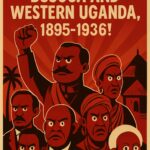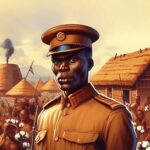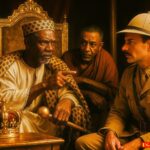Idi Amin’s Uganda: The Rise, Fall, and Legacy of a Notorious Regime
In the heart of East Africa lies Uganda, a nation once hailed as the ‘Pearl of Africa,’ whose history is marred by the tumultuous reign of Idi Amin. From his bloodless coup in 1971 to his dramatic fall in 1979, Amin’s rule was defined by populist rhetoric, brutal oppression, and economic collapse. Operation Mafuta Mingi, the expulsion of Asians, and the infamous Kagera War with Tanzania are just a few milestones that shaped this dark chapter. As Uganda grapples with the scars of ethnic divisions, mass atrocities, and stolen wealth, its journey toward healing offers lessons in resilience and hope. Explore the rise and fall of Idi Amin, the impact of his regime on Uganda, and the enduring spirit of a nation striving to reclaim its identity.

The Kingdom of Broken Promises: A Tale of Chaos and Charisma
Prologue: The Pearl Tarnished
In the verdant heart of East Africa, where the hills rolled like emerald waves and rivers murmured secrets older than time itself, lay a land caught in the throes of its own unravelling. Uganda, once hailed as “the Pearl of Africa” by Winston Churchill himself, now teetered on the precipice of madness—a jewel shrouded in shadows, its lustre dulled by greed, division, and ambition.
And at the centre of this tempest stood Idi Amin Dada, a figure both absurd and terrifying. His booming laughter could fill a room with warmth; his towering frame exuded an almost comical grandeur. Yet beneath that jovial exterior lurked a sinister mind, one capable of unspeakable cruelty. To some, he was a saviour, a liberator from colonial shackles and elitist oppression. To others, he was a spectre, a harbinger of ruin cloaked in military regalia. But whether loved or feared, no one could deny the magnetic pull of Idi Amin—a man who had risen to power not through wisdom or vision but through sheer force of personality, exploiting every fracture within Ugandan society with surgical precision.
Act I: The Coup That Changed Everything
A Quiet Dawn in Kampala
The morning of January 25, 1971, dawned unremarkably over Kampala. The sun rose lazily over the lush green hills that cradled the city, casting a golden hue over its red-dirt streets and colonial-era buildings. Birds chirped cheerfully, oblivious to the seismic shift about to unfold beneath them. In State House, President Milton Obote’s absence—courtesy of a Commonwealth summit in Singapore—had left a vacuum at the heart of Ugandan politics.
What followed was not chaos but chilling precision. Tanks rolled silently through Kampala’s avenues, their treads crunching softly against the asphalt. Soldiers moved with calculated efficiency, seizing key installations—the radio station, the airport, government offices—all without firing a single shot. It was a coup so bloodless, so clinical, that many citizens initially mistook it for a routine military exercise.
By midday, Major General Idi Amin Dada addressed the nation via Radio Uganda. His voice boomed across airwaves, rich with theatrical bravado. “Fellow countrymen,” he declared, his tone dripping with faux humility, “the armed forces have taken control of this great nation to restore peace, unity, and prosperity.” He promised an end to corruption and oppression under Obote’s regime. To those weary of Obote’s increasingly authoritarian rule, these words felt like manna from heaven.
And yet, beneath the surface of this seemingly benign transition lay something darker—a current of ambition, fear, and betrayal that would soon engulf the entire nation.

The Mask Slips
In the days following the coup, euphoria swept through Kampala. Crowds gathered in the streets, cheering Amin’s name as though he were some messianic figure sent to deliver them from tyranny. Street vendors hawked portraits of the new leader alongside roasted maize and sugarcane juice. Even intellectuals, who had long criticized Obote’s heavy-handed governance, allowed themselves a flicker of hope. Perhaps, they thought, Amin could be the saviour Uganda desperately needed.
But behind closed doors, the mask began to slip. Within weeks, rumours spread of mysterious disappearances among Acholi and Langi soldiers—two ethnic groups fiercely loyal to Obote. Whispers turned into screams when bodies started washing up along the banks of the Nile, bloated and mutilated beyond recognition. Those brave enough to investigate discovered mass graves on the outskirts of Kampala, hastily dug and poorly concealed. Thousands of men, stripped of their uniforms and dignity, had been executed all together under cover of darkness.
To the outside world, Amin maintained his façade of benevolence. Publicly, he condemned tribalism and vowed to unite all Ugandans under one banner. Privately, however, he revelled in the carnage, boasting to close confidants about how swiftly he had neutralised potential threats. “You cannot build a house without clearing the rubble first,” he reportedly quipped during a private dinner, his laughter echoing off the walls of State House.
The Silence of the Elites
Remarkably, the atrocities went largely unchallenged by Uganda’s capitalist elite—the wealthy merchants, industrialists, and plantation owners whose wealth had grown fat under British colonial rule. These men, accustomed to wielding influence from behind the scenes, saw Amin not as a monster but as a saviour. Their hatred for Obote’s nationalisation policies—policies that threatened to strip them of their fortunes—blinded them to the horrors unfolding around them.
At lavish parties held in the leafy suburbs of Kololo and Nakasero, champagne flowed freely as businessmen toasted Amin’s rise to power. They spoke of him as a strongman who would restore order and protect their interests. “Better a brute than a bureaucrat,” one plantation owner remarked, raising his glass in mock salute. Another chimed in, “As long as my tea estates remain untouched, I care little for what happens elsewhere.”
Their complacency was breathtaking in its naivety. Few dared to question why Amin’s inner circle consisted almost exclusively of fellow Kakwa tribesmen, or why dissenting voices were swiftly silenced. Even fewer considered the implications of aligning themselves with a man whose loyalty was fickle at best and murderous at worst. For now, the spoils of victory were theirs to enjoy, and they saw no reason to look beyond the glittering façade.
The Seeds of Chaos
Beneath the surface of apparent calm, fractures were already beginning to form. Ethnic tensions simmered as Amin’s purge of Acholi and Langi soldiers deepened divisions within the military. Religious leaders whispered warnings from pulpits, urging caution against celebrating too soon. Intellectuals debated late into the night, torn between cautious optimism and creeping dread.
Yet, for most Ugandans, life continued much as before. Markets bustled with activity, children played football in dusty fields, and fishermen cast their nets into Lake Victoria as they had done for generations. Few grasped the magnitude of what had transpired—or the storm clouds gathering on the horizon.
Idi Amin, meanwhile, basked in his newfound authority. From his opulent suite in State House, he plotted his next move, secure in the knowledge that he had successfully exploited Uganda’s deepest fractures to ascend to power. What he failed to realise—or perhaps chose to ignore—was that the very divisions he manipulated would eventually consume him.
Act II: The Pied Piper of Kampala
The Spell of Liberation
In the months following his coup, Idi Amin Dada emerged as a figure of almost mythical proportions. His towering frame, adorned in crisp military regalia, became synonymous with strength and authority. But it was not just his physical presence that mesmerised the masses—it was his words. With the charisma of a carnival barker and the theatrical flair of a seasoned performer, Amin wove tales of liberation that resonated deeply with Ugandans weary of oppression.
“Uganda belongs to Ugandans!” he thundered during rallies held in bustling marketplaces and dusty village squares alike. His voice carried like a clarion call, reverberating through Kampala’s streets and beyond. To the street vendors hawking mangoes and roasted maize outside Nakasero Market, these words were a promise of opportunity—a chance to claim shops once owned by Asian traders who had long dominated commerce. For unemployed youths idling under the shade of jacaranda trees, they sparked visions of steady work and newfound dignity. Even intellectuals, often sceptical of populist rhetoric, found themselves momentarily seduced by Amin’s fiery anti-imperialist bravado.
For a fleeting moment, Uganda seemed united—not by shared ideals or common purpose but by the intoxicating allure of possibility. Ethnic divisions, religious rivalries, and class tensions appeared to fade into the background as people rallied around their new leader. It was as though Amin had cast a spell over the nation, luring them forward with promises of prosperity and pride.
The Illusion Crumbles
Yet beneath the surface of this euphoric unity lay a cruel truth: Amin cared little for the dreams he inspired. His speeches were carefully crafted performances, designed to distract from the machinations taking place behind closed doors. Like a magician pulling rabbits out of hats, he used populist slogans to mask his authoritarian instincts and consolidate power.
Behind the scenes, Amin plotted his next move—a strategy that would expose the fragility of his support base and set Uganda on a path to ruin. He knew that maintaining control required more than mere words; it demanded actions bold enough to command attention and ruthless enough to eliminate dissent. And so, he began laying the groundwork for one of the most infamous episodes of his regime: Operation Mafuta Mingi.

The Expulsion of Asians
By 1972, Amin’s focus turned squarely toward the Asian community—both those who dominated trade and others who contributed to Uganda’s economy. Framed as an act of economic nationalism, the expulsion of Asians was heralded as a redistribution of wealth to ordinary Ugandans. “We will take back what is rightfully ours,” Amin proclaimed, painting himself as a champion of the downtrodden.
To many, this narrative felt vindicating. Stories circulated of wealthy Asian shopkeepers hoarding profits while local workers languished in poverty. Newspapers ran editorials praising Amin’s decision, framing it as a necessary step toward self-reliance. Street vendors whispered excitedly about inheriting businesses; farmers dreamed of acquiring abandoned plantations.
But reality soon revealed itself to be far less generous. When the deadline arrived—August 4, 1972—tens of thousands of Asians scrambled to leave the only home many had ever known. Families boarded planes with nothing but the clothes on their backs, leaving behind homes, businesses, and lifetimes of memories. Those who resisted faced harassment, arrest, or worse. By year’s end, nearly 50,000 Asians had been expelled, their properties seized by the state.
Paradise Deferred
What followed was neither liberation nor prosperity but chaos. The shops once run by Asians did not magically transfer to eager Ugandan hands; instead, they fell into disrepair, looted or left vacant. Jobs promised to unemployed youths evaporated as industries collapsed without skilled management. Intellectuals who had cheered Amin’s anti-imperialist stance now watched in horror as the economy spiralled downward.
Instead of empowering ordinary citizens, the spoils of Operation Mafuta Mingi enriched a small elite circle of military officers and their cronies—the Mafuta Mingis . These men swaggered through Kampala like peacocks, flaunting ill-gotten wealth in garish displays of excess. Gold chains hung heavy around their necks, and imported cars lined the driveways of mansions they could scarcely afford to maintain. Meanwhile, the majority of Ugandans remained mired in poverty, their hopes dashed against the rocks of greed and corruption.
The Fragility of Unity
As disillusionment spread, cracks began to form in the fragile unity Amin had cultivated. Ethnic tensions resurfaced, exacerbated by preferential treatment given to Kakwa tribesmen within the military. Religious leaders, once silent observers, began speaking out against the regime’s excesses. Intellectuals, emboldened by growing discontent, penned scathing critiques of Amin’s policies.
Even among the elites, alliances grew strained. Wealthy businessmen who had initially supported Amin now chafed under his erratic rule. Some dared challenge him openly, only to find themselves silenced—either killed, like Michael Kawalya Kaggwa and Augustine Kamya, or forced into exile. Others retreated into opportunism, clinging to scraps of influence while ignoring the moral decay surrounding them.
Act III: Operation Mafuta Mingi
The Decree That Shook a Nation
It began with a single announcement, delivered in Amin’s trademark bombastic style, during a nationwide broadcast on August 4, 1972. “Asians who live in Uganda have ninety days to leave this country,” he declared, his voice dripping with theatrical menace. He framed the expulsion as an act of economic nationalism—a bold step toward reclaiming Uganda’s wealth from foreign hands and redistributing it among its rightful owners: ordinary Ugandans.
To many, the decree felt like justice long overdue. For decades, Asian communities—descendants of labourers brought by British colonialists to build railways—had dominated trade and commerce. Their success was undeniable, but so too was the resentment it bred. Stories abounded of wealthy shopkeepers amassing fortunes while local workers languished in poverty. Newspapers ran editorials praising Amin’s decision, hailing it as a necessary purge to cleanse the nation of exploitation.
But beneath the veneer of righteous indignation lay something darker—a calculated move to consolidate power and enrich a select few loyalists. What followed was neither liberation nor equality, but a grotesque carnival of greed and corruption known as Operation Mafuta Mingi.
The Rise of the Mafuta Mingis
Within weeks, tens of thousands of Asians scrambled to flee the only home most had ever known. Families boarded planes clutching whatever possessions they could carry, leaving behind homes, businesses, schools, and memories. By year’s end, nearly 50,000 Asians were gone, their properties confiscated by the state. And into this vacuum stepped Amin’s inner circle—the Mafuta Mingis , or “men of much oil.”
These men were not businessmen in the traditional sense; they were soldiers-turned-entrepreneurs, their uniforms traded for ill-fitting suits that strained against their girth. Gold chains hung thick around their necks, and rings glittered on every finger. They swaggered through Kampala like peacocks, flaunting their newfound wealth with ostentatious displays of excess. Rolls-Royces and Mercedes-Benzes lined the streets outside mansions they barely knew how to maintain.
Ali Fadhul, Nassur, and other generals-turned-capitalists snapped up abandoned businesses at bargain prices—or simply seized them outright. Factories, plantations, shops, and warehouses fell under their control, becoming engines of personal enrichment rather than public benefit. Resources meant for redistribution instead flowed directly into their pockets, fuelled by bribery, coercion, and outright theft. Meanwhile, ordinary Ugandans watched helplessly as the promised paradise slipped further out of reach.
Paradise Deferred
For all the talk of redistribution, the reality was starkly different. Shops once run by Asians did not magically transfer to eager Ugandan hands; instead, they languished in disrepair, looted or left vacant. Jobs promised to unemployed youths evaporated as industries collapsed without skilled management. Intellectuals who had cheered Amin’s anti-imperialist stance now found themselves silenced, their critiques drowned out by propaganda and intimidation.
Those who dared challenge the Mafuta Mingis faced swift retribution. Michael Kawalya Kaggwa, a prominent businessman who questioned the regime’s corruption, disappeared one night, his body never found. Augustine Kamya met a similar fate after attempting to expose financial irregularities within State House. Others fled the country, seeking refuge abroad, while their assets were seized and redistributed among Amin’s cronies.
Even those who remained became complicit in the madness. Opportunists flocked to Kampala, hoping to curry favour with the ruling elite. They turned a blind eye to the suffering around them, content to scrape together scraps of wealth however they could. Morality gave way to survival, and integrity became a luxury few could afford.
The Cracks Begin to Show
By 1973, the cracks in Amin’s grand illusion were impossible to ignore. The economy teetered on the brink of collapse, crippled by mismanagement and corruption. Factories lay idle, fields went untended, and inflation spiralled out of control. Foreign aid dried up as the international community condemned Amin’s regime. Even his own allies began to turn against him.
The Mafuta Mingis , once loyal beneficiaries of Amin’s largesse, now saw him as an obstacle to their continued growth. Infighting erupted as rival factions vied for control of increasingly scarce resources. Allegiances shifted overnight, and paranoia gripped the corridors of power. Whispers of betrayal filled the air, each rumour more sinister than the last.
Behind closed doors, Amin plotted his next move, desperate to cling to power amidst mounting chaos. Yet even he could not escape the consequences of his actions. The kingdom built on broken promises—on stolen wealth and hollow rhetoric—was beginning to crumble, piece by piece.
Act IV: The Descent into Madness
The Theatre of Absurdity
As the years rolled on, Idi Amin’s regime descended further into a surreal blend of megalomania, paranoia, and grotesque self-aggrandisement. By the mid-1970s, his behaviour had become so erratic that even those closest to him struggled to keep up with his increasingly bizarre antics. In one infamous moment, Amin declared himself “Conqueror of the British Empire,” a title he bestowed upon himself during a rambling speech at a state banquet in Kampala. His audience—a mix of bewildered diplomats, nervous aides, and sycophantic generals—applauded politely, unsure whether they were witnessing genius or lunacy.
To add to the absurdity, Amin claimed to have earned a PhD from an obscure institution no one had ever heard of. Diplomatic cables intercepted by foreign intelligence agencies revealed widespread bewilderment over this sudden academic achievement. When pressed for details, Amin waved off questions with characteristic bravado, insisting that his thesis—entitled *“How to Govern Without Interference”—*was a groundbreaking work destined to revolutionise political science worldwide. Few dared laugh openly, but behind closed doors, the ridicule was palpable.
Secrets Beneath State House
While Amin played the role of eccentric despot above ground, darker truths lurked beneath the surface. Rumours swirled about secret torture chambers hidden deep within the bowels of State House, where dissidents vanished without a trace. Those unfortunate enough to be dragged there spoke of unspeakable horrors—electric shocks, beatings, mock executions—all designed to extract confessions or punish perceived enemies of the state.
One particularly infamous tale claimed that Amin kept severed heads of his victims preserved in jars, displayed like macabre trophies in a private chamber. Whether true or not, the story spread like wildfire, fuelling both fear and fascination. For many Ugandans, these whispers served as grim reminders of what awaited anyone foolish enough to cross the dictator. Even members of Amin’s inner circle lived in constant dread, knowing that loyalty today did not guarantee safety tomorrow.
Economic Ruin and Social Collapse
Above ground, the effects of Amin’s misrule became impossible to ignore. The economy, already fragile following Operation Mafuta Mingi, collapsed entirely under the weight of corruption, mismanagement, and international isolation. Factories once owned by Asians lay idle, their machinery rusting away. Fields went untended as farmers abandoned crops they could no longer sell. Hyperinflation spiralled out of control, rendering currency nearly worthless. A loaf of bread, once affordable, now cost several thousand shillings, forcing ordinary Ugandans to barter goods just to survive.
Foreign aid, which had previously propped up the country’s faltering finances, dried up completely as the international community condemned Amin’s regime. Sanctions imposed by Britain and other nations choked off vital imports, leaving shelves bare and hospitals empty of essential supplies. Diplomats fled Kampala, and embassies shuttered their doors, cutting Uganda off from the rest of the world.
Amidst this chaos, social cohesion began to fray. Ethnic tensions flared anew as resources dwindled, pitting neighbour against neighbour in desperate bids for survival. Religious leaders who had once preached patience and unity now issued fiery sermons denouncing Amin’s tyranny. Intellectuals, long silenced by fear, risked everything to pen scathing critiques smuggled out of the country via underground networks. But their words fell largely on deaf ears; most Ugandans were too preoccupied with day-to-day survival to think beyond immediate needs.
Betrayal Among the Ranks
Even among the elite—the Mafuta Mingis —loyalty crumbled under the strain of Amin’s madness. Once eager beneficiaries of his largesse, these men now saw him as an obstacle to their continued growth. Ali Fadhul, Nassur, and others grew frustrated as Amin’s erratic decisions undermined their businesses. Factories seized during Operation Mafuta Mingi sat idle due to lack of investment, while corrupt practices stifled innovation and productivity.
Worse still, Amin’s growing paranoia led him to turn on his own allies. Generals accused of plotting coups disappeared overnight, their assets seized and redistributed among new favourites. Those who remained walked a tightrope, knowing that any misstep could mean death—or worse. Infighting erupted as rival factions vied for control, each hoping to position themselves as the next heir apparent when Amin inevitably fell.
By 1978, it was clear that Amin’s grip on power was slipping. His once-charismatic persona had devolved into a caricature of itself, mocked openly by those brave enough to do so. Yet, despite his declining influence, Amin clung stubbornly to authority, lashing out at real and imagined enemies with increasing ferocity. It was only a matter of time before his hubris brought him crashing down.
Act V: The Fall of the Tyrant
Hubris on the Horizon
By late 1978, Idi Amin’s grip on reality—and power—had all but slipped away. His regime, once propped up by fear and opportunism, now teetered precariously on the edge of collapse. Yet rather than retreat into obscurity or attempt to salvage what remained of his crumbling kingdom, Amin chose a path that would seal his fate: war.
On October 30, 1978, Amin made a bold and reckless proclamation. He declared ownership of Tanzania’s Kagera region, accusing President Julius Nyerere of harbouring Ugandan rebels who sought to overthrow him. With characteristic bombast, he ordered an invasion, claiming the territory as rightfully Ugandan. “We will teach Nyerere a lesson he will never forget!” Amin thundered during a press conference in Kampala, flanked by nervous generals whose faces betrayed their unease.
The attack was swift but poorly executed. Ugandan troops crossed the border, looting villages and wreaking havoc across northern Tanzania. For a brief moment, it seemed as though Amin’s gamble might pay off; his forces occupied parts of Kagera, and triumphant headlines blared across state-controlled media. But this fleeting victory masked a fatal miscalculation. Instead of cowering before Uganda’s aggression, Tanzania struck back with devastating force.
The Counterattack
Under the leadership of Julius Nyerere, Tanzanian troops mobilised with remarkable efficiency. They were joined by thousands of Ugandan exiles—former soldiers, intellectuals, and ordinary citizens united by a shared desire to rid their homeland of Amin’s tyranny. Together, they formed the Uganda National Liberation Army (UNLA), a ragtag yet determined coalition hell-bent on reclaiming their country.
What followed was a masterclass in military strategy. Tanzanian forces, equipped with superior training and morale, pushed deep into Ugandan territory. Village after village fell to the advancing army, each liberated settlement greeted with cheers from locals weary of Amin’s rule. By early 1979, the tide had turned decisively against Uganda.
Amin, ever the showman, tried to rally support through grandiose speeches and hollow promises. He declared himself “Field Marshal Supreme” and vowed to defend Kampala to the last man. But behind closed doors, panic set in. His generals, many of whom had grown disillusioned with his erratic leadership, began defecting en masse. Those who remained were either too afraid to act or simply biding their time until the inevitable end.
The Siege of Kampala
By March 1979, Tanzanian and UNLA forces stood poised at the gates of Kampala. The city, once a vibrant hub of commerce and culture, now lay besieged, its streets deserted save for sporadic bursts of gunfire and the wail of ambulances ferrying wounded civilians to overcrowded hospitals. State House, the opulent palace where Amin had ruled with an iron fist, became a fortress under siege.
Inside, chaos reigned supreme. Amin alternated between fits of rage and moments of eerie calm, issuing contradictory orders to his beleaguered commanders. Rumours spread among his inner circle that he planned to flee, abandoning them to face the wrath of the advancing army. Some pleaded with him to surrender; others plotted desperate escapes of their own. Loyalty dissolved into betrayal as aides scrambled to save themselves.
On April 11, 1979, the final assault began. Artillery shells rained down on Kampala, reducing entire neighbourhoods to rubble. Flames licked the sky as oil depots ignited, casting an apocalyptic glow over the city. Amidst the carnage, Amin slipped away, boarding a helicopter bound for Libya. His departure marked not just the fall of a tyrant, but the collapse of an era defined by cruelty, corruption, and chaos.
Exile and Aftermath
Amin resurfaced weeks later in Saudi Arabia, where he lived out his days in relative obscurity. Gone was the swaggering dictator who had once strutted through Kampala like a peacock; in his place stood a bloated, broken man haunted by memories of the empire he had destroyed. Attempts to return to politics fizzled quickly, dismissed as laughable even by those sympathetic to his cause.
Meanwhile, Uganda struggled to rebuild from the ashes of his reign. The economy lay in ruins, infrastructure reduced to rubble, and trust between communities shattered beyond recognition. Thousands of refugees trickled home, only to find their properties seized or destroyed. Ethnic tensions simmered anew, exacerbated by years of division and violence.
Yet amidst the devastation, glimmers of hope emerged. Intellectuals returned from exile, eager to help reconstruct the nation. Religious leaders preached reconciliation, urging forgiveness without forgetting. Ordinary Ugandans, weary but resilient, rolled up their sleeves and began the arduous task of healing wounds both visible and invisible.
Epilogue: Echoes of the Past
A Fragile Dawn
Decades have passed since Idi Amin’s fall, yet his shadow still looms large over Uganda. The scars of his reign are etched not only into the landscape—abandoned factories, crumbling roads, and villages left hollow—but also into the collective psyche of a nation that bore witness to unspeakable horrors. To this day, elders gather beneath mango trees in rural villages, recounting tales of mass graves and secret torture chambers to wide-eyed grandchildren too young to remember. These stories, whispered like prayers or curses, serve as both cautionary tales and painful reminders of what happens when ambition is unchecked and division allowed to fester.
In Kampala, where once the dictator strutted through marble halls dripping with gold and blood, life has moved on but not without residue. Street vendors hawk their wares near buildings scarred by artillery fire from the 1979 liberation war; graffiti scrawled on crumbling walls declares, “Never Again.” Even the younger generation, born long after Amin’s exile, feels the weight of history pressing down upon them. They hear it in the silence of grandparents reluctant to speak, see it in the haunted eyes of survivors, and feel it in the lingering mistrust between ethnic groups fractured during those dark years.
Yet amidst the ruins lies something else—a glimmer of hope, fragile but persistent, like the first rays of sunlight breaking through storm clouds. It is there in the laughter of children playing football on dusty fields, oblivious to the ghosts that haunt their elders. It is there in the determination of entrepreneurs reopening shops once seized and abandoned. And it is there in the quiet resilience of ordinary Ugandans, who refuse to let their country be defined solely by its darkest chapter.
Reckoning with History
The process of reckoning with Amin’s legacy has been slow and fraught with challenges. Truth commissions convened in the years following his ousting sought to document atrocities and hold perpetrators accountable, but political instability and shifting priorities often sidelined these efforts. Some argued for forgiveness and reconciliation, while others demanded justice—even if it meant reopening old wounds.
Archives filled with faded photographs and brittle documents tell fragmented stories of loss and survival. Museums dedicated to preserving memories of the era stand as sombre monuments to resilience, drawing visitors from across the globe. Yet even today, debates rage about how best to commemorate—or condemn—the man who called himself “Conqueror of the British Empire.”
For some, Amin remains an enigma, a figure whose charisma masked cruelty so profound it defies comprehension. For others, he is a symbol of everything wrong with unchecked power: greed, paranoia, and the devastating consequences of ruling through fear rather than unity. His name evokes shudders, yes, but also lessons hard-learned about the fragility of democracy and the importance of vigilance.
A Nation Rebuilding
Despite the challenges, Uganda has made strides toward renewal. Economic reforms implemented in the 1990s laid the groundwork for recovery, though progress remains uneven. Cities buzz with newfound energy as skyscrapers rise alongside colonial-era landmarks, blending old and new in ways that reflect the nation’s complex identity. Tech startups founded by ambitious youth promise innovation, while farmers tend fields nourished by rich volcanic soil, determined to feed a growing population.
Culturally, Uganda continues to thrive. Music blares from roadside bars, pulsating with rhythms that blend traditional beats with modern influences. Artists paint vibrant murals depicting scenes of struggle and triumph, reclaiming public spaces tainted by memories of oppression. Writers and filmmakers explore themes of memory, healing, and redemption, ensuring that the past is neither forgotten nor repeated.
But perhaps the most remarkable sign of renewal lies in the resilience of its people. Communities torn apart by ethnic strife during Amin’s rule now work together to rebuild trust. Religious leaders preach messages of unity, urging forgiveness without forgetting. Schools teach students not just about history but about civic responsibility, instilling values of empathy, accountability, and cooperation.
The Pearl of Africa
And so, the question lingers: Will Uganda ever reclaim its title as the Pearl of Africa? The answer lies not in grand gestures or sweeping declarations but in the countless small acts of courage and kindness performed daily by its citizens. In markets bustling with activity, in classrooms alive with curiosity, in hospitals staffed by dedicated healers—in all these places, the spirit of renewal flickers brightly.

Uganda may never fully erase the echoes of its past, nor should it try. Those echoes remind future generations of the dangers of division and the cost of tyranny. But they also serve as a call to action, urging Ugandans to build a better tomorrow—not out of fear, but out of hope.
Perhaps one day, travellers will once again marvel at the lush green hills that kiss the sky, the rivers that whisper secrets to the earth below, and the vibrant tapestry of cultures woven together in harmony. Perhaps then, the Pearl of Africa will shine again—not as a relic of nostalgia, but as a beacon of possibility.

















